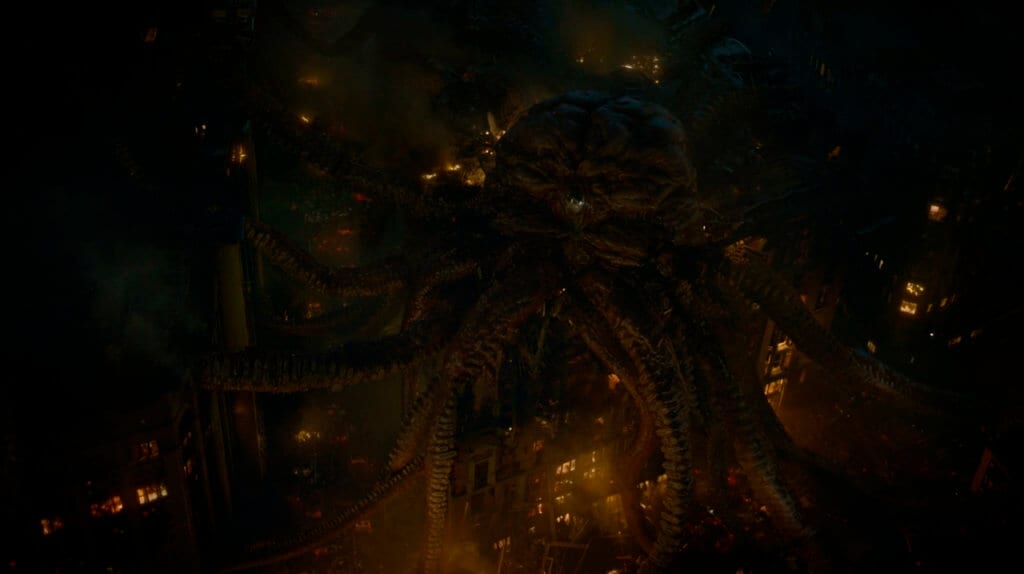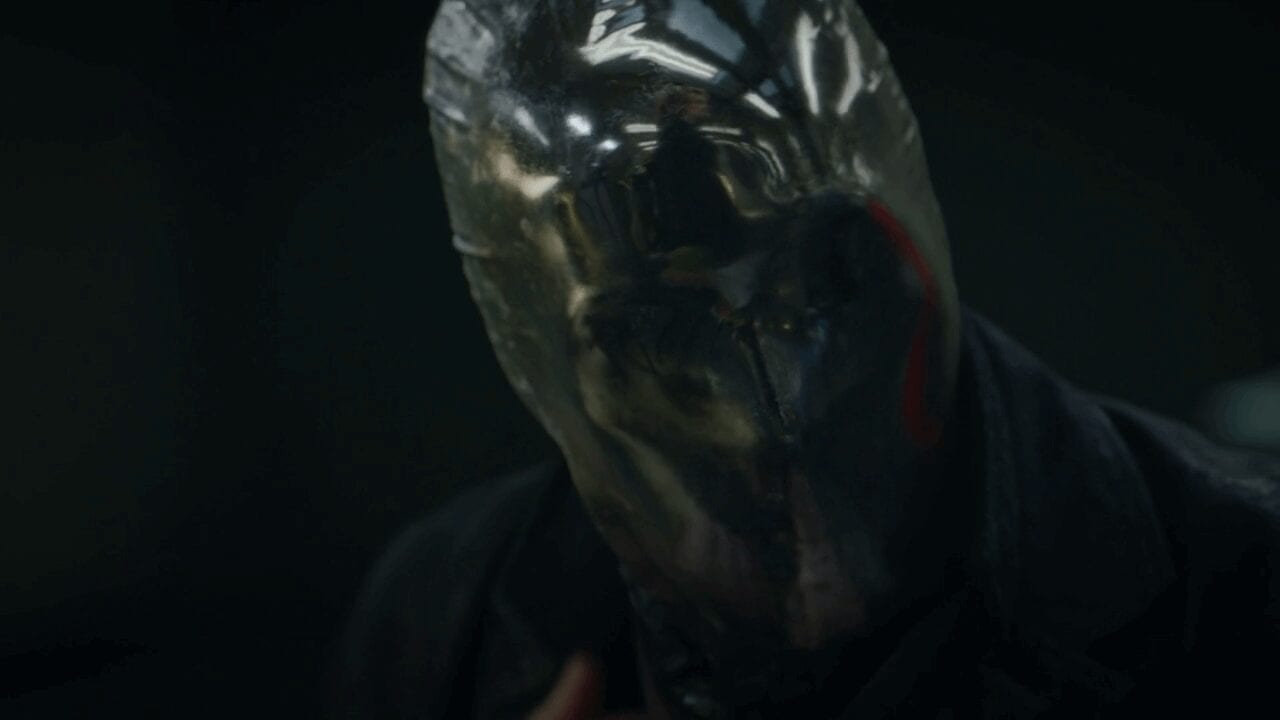REVIEW: Watchmen – Season 1, Episode 5 “Little Fear of Lightning”
“Little Fear of Lightning” suggests that Watchmen’s best episodes will be the ones that aren’t focused on Angela Abar. This week puts Looking Glass under the… let’s got with “microscope,” and manages to be a marked improvement over the previous installment, and even a little better than the Laurie-centric “She Was Killed By Space Junk.” Some key pieces of the show’s puzzle fall into place, and a previously bland character finally gets some color. Of course, there are still bizarre happenings – one very similar to Laurie’s toy from two weeks ago, but even more nonsensical – and some truly awful dialogue, but at least it holds the interest.
Wade Tillman awaits an answer from his ex-wife while the origin of his Looking Glass persona is revealed. Laurie keeps tabs on Tillman and Angela. A seemingly random acquaintance may provide a new path for Tillman. Adrian Veidt is ready to perform his experiment.
The opening of “Little Fear of Lightning” travels back to the night of Adrian Veidt’s triumph at the end of the comic book. While the giant squid (which looks great on-screen) attacked Manhattan, young Wade Tillman was across the river in Hoboken, proselytizing at a carnival with his Jehovah’s Witness brothers. After a humiliating encounter with a local, he finds himself alone in a house of mirrors when the squid explodes. This moment shapes his life forever, from his apparent renunciation of his religious beliefs to his distrust of anyone who gets close to him, to his ability to spot a liar. It also formed the basis for his superhero/cop alter ego Looking Glass. While Watchmen seems to have misunderstood its source material on a number of other matters, this scene gets it right; the survivors of ground zero (creepy how life imitates art sometimes) would be traumatized by Veidt’s attack, and having one of the new characters wear a mask because of it is in keeping with the damaged personas of the comic’s heroes.
*SPOILERS*
In Tillman’s case, the squid made him a paranoiac with a bomb shelter and warning system, waiting for the next sea monster to drop out of the sky. It also gave him an all-consuming fear of “psychic attacks,” a nice callback to the psychic energy Veidt used to make the squid. This fear is why Tillman uses a foil mask when assuming the guise of Looking Glass: he and other survivors believe that the foil will protect them from the psychic energy if another squid shows up on Earth. It’s a pretty on-the-nose reference to tin-foil-hat conspiracy theorists, but unlike a lot of Watchmen’s sillier details – some of which find their way into “Little Fear of Lightning: – it works. Seeing the cap Tillman wears in his private life lined with the same foil as his mask is sad; he’ll never be free of the horrors Veidt inflicted on him. His chairing of a support group for squid survivors and their family members further illustrates Tillman’s character; he’s a decent man at heart, and despite the morally questionable aspects of his job (which Laurie dutifully enumerates again, though the dialogue ultimately fails that scene), he genuinely wants to help people.
Tillman’s truth-detecting skills also came from the squid, though “Little Fear of Lightning” keeps it ambiguous as to what actually caused them. Was it the psychic energy of the squid detonation, or the punk Jersey girl who took advantage of his innocence? I tend to think it’s the girl, and Tillman is just a human like everyone who isn’t Doctor Manhattan. Either way, he now moonlights as a focus group plant letting companies know when John and Jane Q Public are being honest in their appraisals of the newest product to hit the market. It also won’t allow him to have a healthy romantic relationship, as his ex-wife explains when she says he never trusted her during their marriage. Tillman is now a sad, lonely man, drifting through life with no one to love or trust and waiting with rudimentary defenses for the other shoe to drop. This is an important indictment of Veidt’s action in the comic, a glimpse of the people who were hurt in his quest for world peace.
Tillman’s decency and lack of trust come into play when he meets Renee, an equally lonely woman who attends one of his support group meetings. When they go out for drinks afterward, Tillman begins to connect with her, and things finally start looking up for him – until the truck that takes her home drops a head of lettuce from the back. Tillman gets the lead his colleagues have been searching for since Judd Crawford was murdered, and he appears on the cusp of blowing the whole case wide open. Of course, since we’ve got half a season to go, it’s a trap. But plenty is revealed about the Seventh Kavalry; they’re led by Senator Keene, and while most of them are white supremacists, they’re being used for other purposes. And the mastermind behind it all is, of course, Adrian Veidt, who set all this into motion just before the squid attack. And now, Tillman must become an accomplice to the people who destroyed his life, lest others suffer for his defiance. I was afraid “Little Fear of Lightning” would fail Tim Blake Nelson, but it gives him plenty of meat to chew on, and he does so exceptionally well, making Tillman a sympathetic character who would have made a much better lead than the boring Angela Abar. (I wonder if every other episode will be a disappointing look at what could have been.)

Unfortunately, there are parts of “Little Fear of Lightning” that don’t work. Expanding Adrian Veidt’s plan from the comics actually undermines it. Once the squid exploded and the world leaders began to cooperate, Veidt enthusiastically declared victory. Now we’re meant to accept that he’d only accomplished phase one and that he had a series of follow-up phases, including forming the Seventh Kavalry, getting Senator Keene on his side, and periodically showering the world with squid to make everyone believe a new threat was imminent. It doesn’t fit, nor does the apparent lack of any tangible evidence that there were ramifications of the squid attack beyond the scarred psyches of the survivors. We never see any evidence of world peace; in point of fact, man’s inhumanity to man seems to have been exacerbated since then. Speaking of Veidt, we still don’t know why he’s being locked away, who is keeping him prisoner, or why they would give him access to things that would allow him to escape. I assume in his brief space sojourn he’s asking Doctor Manhattan for help, which would indicate that it’s probably Lady Trieu behind his confinement. Jeremy Irons still plays Veidt entirely too theatrically for my taste, making him seem like a complete basket case. And the scene where Tillman watches gay superhero porn comes out of nowhere and has no bearing on the plot or Tillman’s character, particularly as it’s made clear that he’s not gay, or even bisexual (unless he’s secretly bisexual, for some reason). Like Laurie’s Doctor Manhattan dildo, this is present only for shock value, and it makes it difficult to take anything else on the show seriously. Also contributing to this is the sometimes atrocious dialogue, such as Laurie’s high-school-bully-like needling of Tillman, Veidt’s goofy recruitment video, or Tillman’s groaner lines thrown in to make sure the audience doesn’t pick up on the subtleties of Tim Blake Nelson’s performance.
“Little Fear of Lightning” is the best Watchmen episode yet, but it’s still held back from being great television. Some intriguing answers to a few of the show’s mysteries, strong links to the comic book, and an excellent performance from Tim Blake Nelson are balanced by awful dialogue, weak links to the comic book, and a hammy performance from Jeremy Irons. It looks like next week will bring us back to Angela’s perspective and the focus on race, so I imagine this respite won’t last.
Watchmen – "Little Fear of Lightning"
Plot - 8.1
Acting - 7.8
Progression - 9.1
Production Design - 8.7
Themes - 8.4
8.4
Good
“Little Fear of Lightning” is the best Watchmen episode yet, but it’s still held back from being great television. Some intriguing answers to a few of the show’s mysteries, strong links to the comic book, and an excellent performance from Tim Blake Nelson are balanced by awful dialogue, weak links to the comic book, and a hammy performance from Jeremy Irons.







